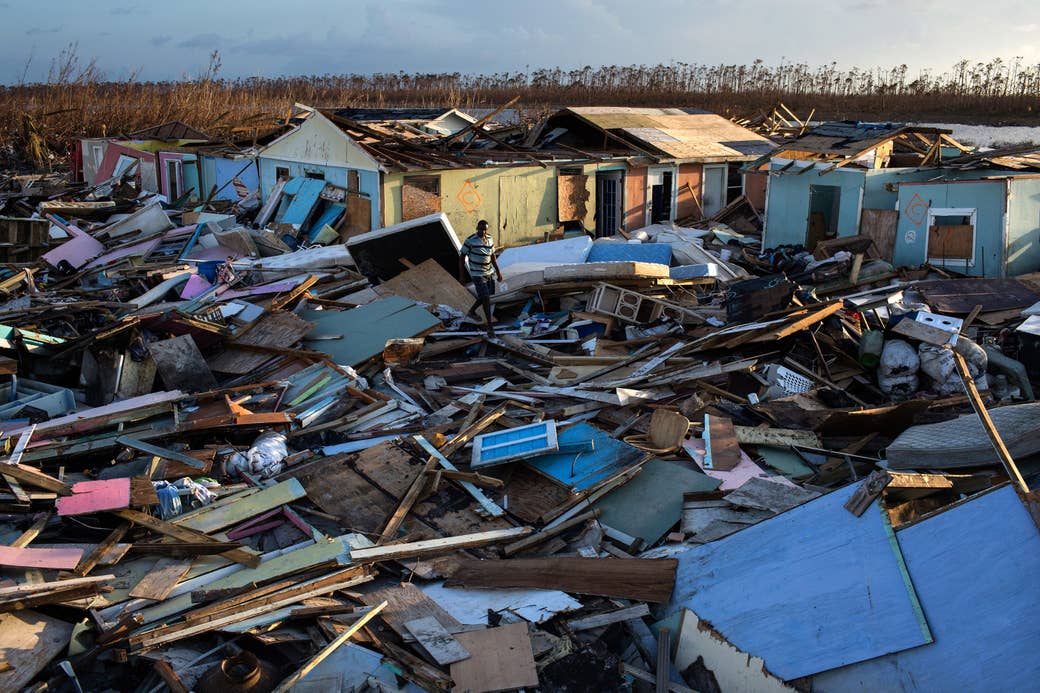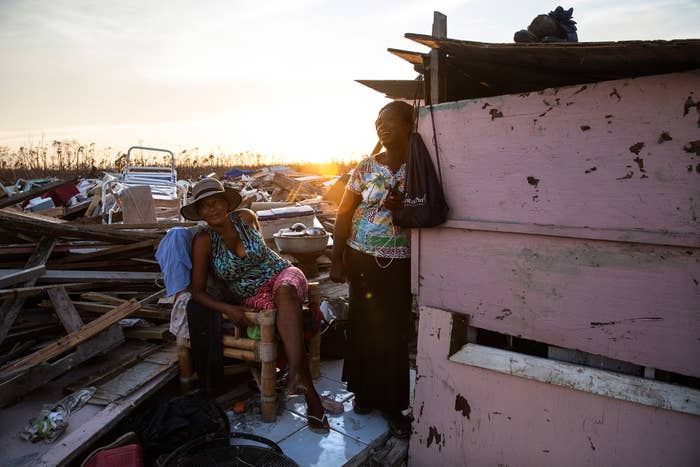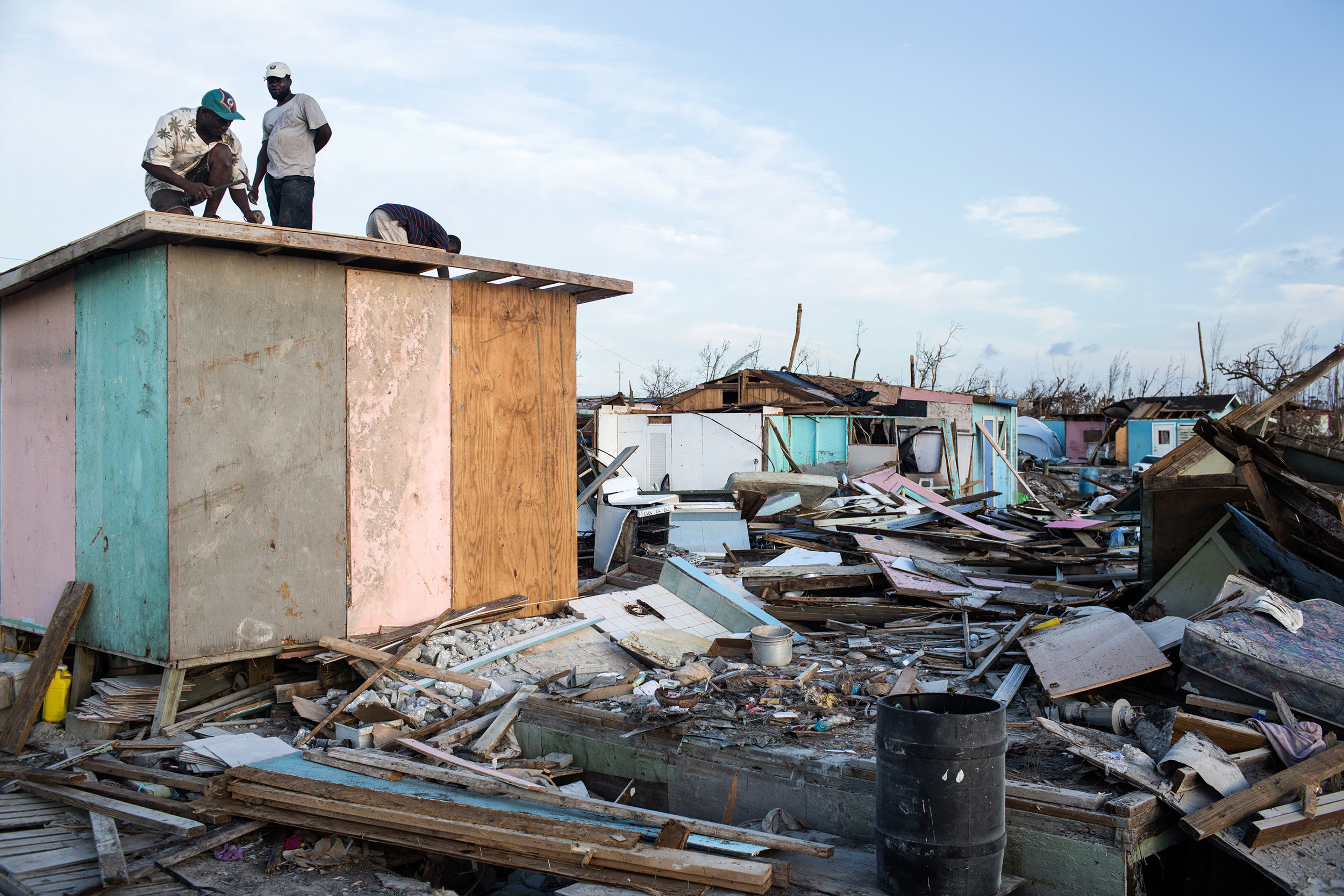
The Bahamas government is barring thousands of Haitians displaced by Hurricane Dorian from returning to their communities, threatening undocumented immigrants in shelters with deportation, and is making it nearly impossible to keep a job if a person can't prove they have a work permit or “satisfactory living conditions.”
Advocacy and aid groups say the new rules blatantly target a vulnerable population that has been systematically mistreated and maligned for years.
“This storm is looking like the opportunity that the government wanted or needed to be able to finally rid themselves of Haitians amongst us and the shanty towns,” said Louby Georges, a director with Human Rights Bahamas and spokesperson for the newly-formed United Haitian Community Front. “They’ve always wanted to do it, but there’s never been any legal avenues. There is currently a court injunction stopping the government from demolishing the shanty towns and then this storm came and it’s a gift for them and, based on their actions, that’s how they’re treating it.”
A month after the Category-5 hurricane pummeled the chain of islands, the death toll has only inched incrementally to 60 people, although medical workers and officials say that number is expected to rise since hundreds of others are still listed as missing. Many families, however, may never get the final word about loved ones because they were undocumented.
The bulk of the dead were found on Great Abaco in the Haitian shanty town communities of The Mudd, Pigeon Peas, Sand Banks, and Marsh Harbour. In 2018, a task force reported that about 3,5000 Haitian migrants lived across Great Abaco. Crews are still finding bodies in the debris.
The Bahamas’ relationship with and treatment of Haitian migrants, who have poured into the Caribbean country in search of work and better living conditions, was fraught long before the storm. Thousands were living in the shoddy shanty town neighborhoods that were erected without proper water and electricity. They worked as day laborers, cooking, cleaning, building, and gardening across the islands’ collection of hotels, resorts, and wealthier neighborhoods.

After a monumental earthquake rocked Haiti in 2010, affecting 3 million people and killing more than 250,000 others, thousands of displaced residents resettled in the Bahamas. Haitians quickly became the archipelago nation’s largest minority group. There were between 40,000 and 60,000 living across the islands, according to a 2018 report from the US State Department, intensifying friction between the burgeoning population and Bahamian nationals.
Although the Bahamas relies on Haitians for cheap labor, the government has made it extremely difficult for the undocumented residents to assimilate. They cannot own land without a passport, which is tough to apply for, and work permits are expensive to obtain. Their children aren’t “legal” since the Bahamas does not give birthright citizenship to the offspring of undocumented residents, rendering many stateless and constantly living in fear of deportation.
On Wednesday, Prime Minister Dr. Hubert Minnis issued another decree, telling a House Assembly meeting that he has directed his attorney general to retake land on which thousands of Haitians had lived.
A court injunction had prevented the government from demolishing the shanty towns. But that all changed with the destruction brought by Dorian.
Referencing the country’s constitution, Minnis said he had also informed the International Organization for Migration that Bahamian officials will be staunchly enacting their laws “in respect to illegal immigrants.”
“Therefore, I serve notice to all those who are illegal that they can leave voluntarily or they will be forced to leave,” he said.
Several government ministers did not respond to requests for comment. But they have publicly said they are merely following what’s allowed under the constitution.
Earlier this week, the Minister of Immigration stated that storm victims living in shelters are “still subject to deportation and the enforcement of the immigration laws.” And those letting “illegal persons” stay in homes or churches could be fined up to $10,000 or put in prison.
The government has turned extremely "right-wing, almost fascist," in the way it has "conducted a witch hunt against a very vulnerable group of people," Chris Curry, a professor of history at the University of the Bahamas, told BuzzFeed News.
"Many of these people see the Bahamas, see Abaco, as their home because they were born here. They've never been to Haiti, but they're still stateless," he said. "It's very painful to see how our government is ignoring blatant, universally-recognized treaties on how you deal with refuges, evacuees, persons who are victims of natural disasters."
Humanitarian groups estimate that more than 2,000 Haitians were displaced by Dorian. And of the 1,641 people living in nine shelters across Nassau and Grand Bahama, aid workers say about 75% of them are Haitian.
“The majority of people in shelters are afraid to be there. They have expressed that. They are afraid of walking across the street and being arrested,” Daylland Moxey, a volunteer with HeadKnowles Bahamas, told BuzzFeed News.
Even if a person has a valid work permit but has lost their job or cannot prove they have “satisfactory living accommodations”, they are at risk of arrest or deportation, according to the department of immigration, citing a 2014 policy.
“If the employer is still paying them then they have a job, if not then they need to go home,” Attorney General Carl Bethe told the Tribune on Monday. “The files will reflect who the business or homeowner applicant is. We will know if a job exists.”
If an undocumented resident wants to apply for a work permit for the first time, they “must be living in his or her home country,” the law states.
“They are waiting to round them up, arrest, and deport them,” Georges said when asked about the slate of recent orders.
The head of hurricane relief efforts in Abaco, where many of the shanty town communities were located, explicitly called out Haitians who are trying to return back to what’s left of their homes.
“For example, there are rumors that Haitians are returning to Abaco, correct? So they have no legal status to return to Abaco, so why are they returning to Abaco? So, when we say, ‘shouldn’t go back,’ we’re actually referring to that group of people,” Algernon Cargill told the Nassau Guardian, adding that “they have no status or no reason to be there.”
When the Category-5 storm reduced their neighborhoods to matchsticks and rubble, many Haitians hunkered down, refusing to leave out of fear that, if they did, they’d never be allowed back.
Weeks after the hurricane struck, hundreds were still there, according to a Sept. 19 assessment distributed to aid groups, clustered among the piles of debris, living in churches and mangled houses. In Sand Banks, a community of about 350, nearly half the residents had stayed behind.
Sitting against a pile of wood planks and air conditioning vents stacked outside the Sand Banks’ First Gospel Baptist Church, Thomas Riviere told BuzzFeed News in September that he and his neighbors remained because it's their home and they really didn’t have any other choice because “Haiti’s government is bad.”
“We are black people, just like the Bahamian people, but some Bahamian people treat Haitian people just like dogs,” the 52-year-old said. “I was living here for 22 years. What do we ask? It’s simple to answer. We want to be treated just like they treat themselves. Water pass here. Light pass here. The place where we build our houses, they don’t belong to us.”
Riviere and about a dozen others were living in an airy, one-room building as community members tried to decide what to do next.
“That’s the way we live,” Riviere said as he gestured to the field of bright crumpled walls, doors, and roofs. “They don’t treat us like humans, like everybody...this is our country...we stay...however they treat you, your country, you don’t have no choice. Even if they treat you just like dogs. You don’t have no choice.”

